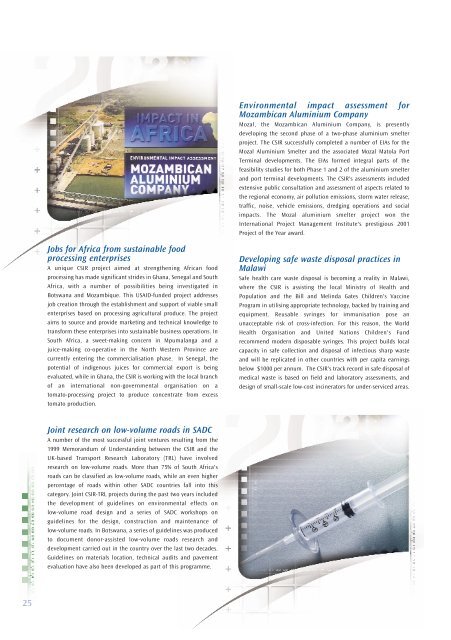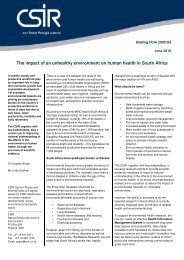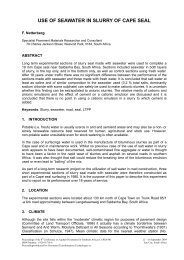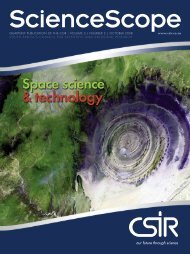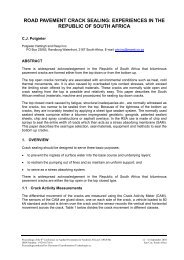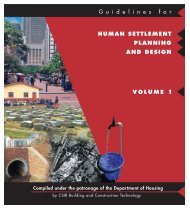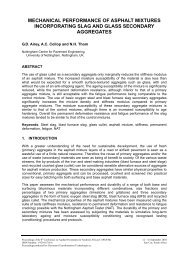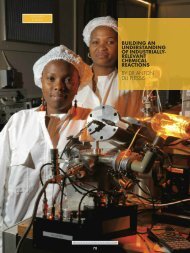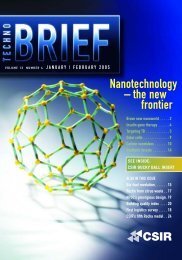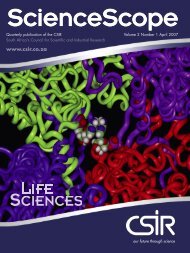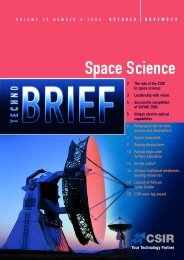CSIR Technology Impact 2002
CSIR Technology Impact 2002
CSIR Technology Impact 2002
You also want an ePaper? Increase the reach of your titles
YUMPU automatically turns print PDFs into web optimized ePapers that Google loves.
25<br />
Jobs for Africa from sustainable food<br />
processing enterprises<br />
A unique <strong>CSIR</strong> project aimed at strengthening African food<br />
processing has made significant strides in Ghana, Senegal and South<br />
Africa, with a number of possibilities being investigated in<br />
Botswana and Mozambique. This USAID-funded project addresses<br />
job creation through the establishment and support of viable small<br />
enterprises based on processing agricultural produce. The project<br />
aims to source and provide marketing and technical knowledge to<br />
transform these enterprises into sustainable business operations. In<br />
South Africa, a sweet-making concern in Mpumalanga and a<br />
juice-making co-operative in the North Western Province are<br />
currently entering the commercialisation phase. In Senegal, the<br />
potential of indigenous juices for commercial export is being<br />
evaluated, while in Ghana, the <strong>CSIR</strong> is working with the local branch<br />
of an international non-governmental organisation on a<br />
tomato-processing project to produce concentrate from excess<br />
tomato production.<br />
Joint research on low-volume roads in SADC<br />
A number of the most successful joint ventures resulting from the<br />
1999 Memorandum of Understanding between the <strong>CSIR</strong> and the<br />
UK-based Transport Research Laboratory (TRL) have involved<br />
research on low-volume roads. More than 75% of South Africa's<br />
roads can be classified as low-volume roads, while an even higher<br />
percentage of roads within other SADC countries fall into this<br />
category. Joint <strong>CSIR</strong>-TRL projects during the past two years included<br />
the development of guidelines on environmental effects on<br />
low-volume road design and a series of SADC workshops on<br />
guidelines for the design, construction and maintenance of<br />
low-volume roads. In Botswana, a series of guidelines was produced<br />
to document donor-assisted low-volume roads research and<br />
development carried out in the country over the last two decades.<br />
Guidelines on materials location, technical audits and pavement<br />
evaluation have also been developed as part of this programme.<br />
Environmental impact assessment for<br />
Mozambican Aluminium Company<br />
Mozal, the Mozambican Aluminium Company, is presently<br />
developing the second phase of a two-phase aluminium smelter<br />
project. The <strong>CSIR</strong> successfully completed a number of EIAs for the<br />
Mozal Aluminium Smelter and the associated Mozal Matola Port<br />
Terminal developments. The EIAs formed integral parts of the<br />
feasibility studies for both Phase 1 and 2 of the aluminium smelter<br />
and port terminal developments. The <strong>CSIR</strong>'s assessments included<br />
extensive public consultation and assessment of aspects related to<br />
the regional economy, air pollution emissions, storm water release,<br />
traffic, noise, vehicle emissions, dredging operations and social<br />
impacts. The Mozal aluminium smelter project won the<br />
International Project Management Institute's prestigious 2001<br />
Project of the Year award.<br />
Developing safe waste disposal practices in<br />
Malawi<br />
Safe health care waste disposal is becoming a reality in Malawi,<br />
where the <strong>CSIR</strong> is assisting the local Ministry of Health and<br />
Population and the Bill and Melinda Gates Children's Vaccine<br />
Program in utilising appropriate technology, backed by training and<br />
equipment. Reusable syringes for immunisation pose an<br />
unacceptable risk of cross-infection. For this reason, the World<br />
Health Organisation and United Nations Children's Fund<br />
recommend modern disposable syringes. This project builds local<br />
capacity in safe collection and disposal of infectious sharp waste<br />
and will be replicated in other countries with per capita earnings<br />
below $1000 per annum. The <strong>CSIR</strong>'s track record in safe disposal of<br />
medical waste is based on field and laboratory assessments, and<br />
design of small-scale low-cost incinerators for under-serviced areas.


